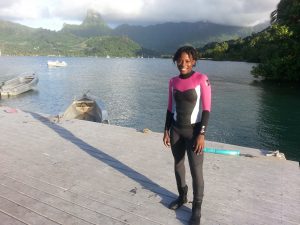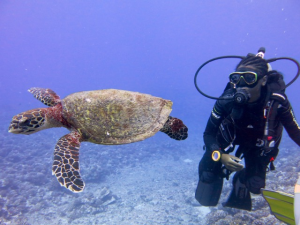 Ashlyn Ford
Ashlyn Ford
My current research interest involves marine ecology. More specifically, my focus is on infectious diseases in coral reefs. I am interested in assessing the health of tropical reef communities and evaluating how infectious diseases are impacting different aspects of these communities. Also, interested in how anthropogenic stressors may by the cause or influence of recent increased marine infectious diseases in the Indo-Pacific region. My ultimate objective is to inform and assist in efforts by collecting data on potential impacts and influences of current and future disease disturbances in coral reefs.
B.S. Environmental Science
Florida Agricultural and Mechanical University, 2017
Shalanda Grier
I am broadly interested in community ecology. More specifically, I am interested in understanding how environmental stress and species-species interactions affect the resiliency of marine/coastal communities. I am also interested in understanding the role of microbial associates in these communities and how they may impact the outcomes of communities experiencing environmental stress.
B.S. Biology, Hampton University, 2015
Regina Zweng
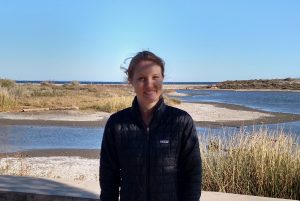
Regina Zweng is a 2nd year PhD student focusing on coastal ecology. Her master’s thesis research focused on the effects of ocean acidification on photosynthesis in tropical macroalgae. She found that the impacts of ocean acidification on photosynthesis in algae will depend on light availability and carbon use strategies. For her PhD research, she is focusing on the impacts of macroalgal blooms in estuaries in Southern California and the Central Coast. Specifically, she is looking at how the carbonate chemistry of seawater changes as a result of macroalgal blooms and how that in turn affects the ecosystem.
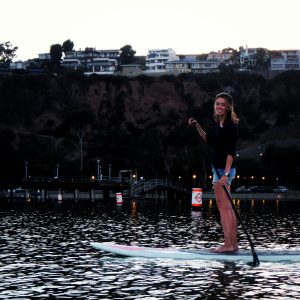 Lauren Smith
Lauren Smith
Invasive species are reshaping ecosystems worldwide. Understanding these changes helps to inform conservation steps needed to maintain natural communities. I am broadly interested in the mechanisms and impacts of invasive species in marine systems. Currently, my work is focused on invasive Sargassum horneri found in southern California.
B.S. Marine Biology, University of California, Santa Cruz, 2012
Emily Ryznar
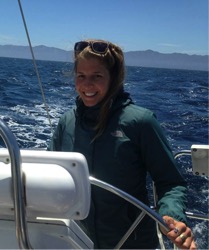 I am generally interested in marine community ecology and conservation, particularly the importance of positive interactions in structuring ecosystems and promoting stability. For my PhD, I am investigating the role of crustose coralline algae (CCA) and its associated microbial community in facilitating settlement and enhancing early survivorship for benthic marine invertebrates in California kelp forests. CCA are globally distributed, calcifying macroalgae known to positively contribute to the surrounding ecosystem in a variety of ways, including facilitating the settlement of many larval invertebrates such as coral and abalone. My dissertation research aims to understand the relationship among CCA, its microbiome, and benthic community structure and stability, with an ultimate goal of applying this research to conservation initiatives.
I am generally interested in marine community ecology and conservation, particularly the importance of positive interactions in structuring ecosystems and promoting stability. For my PhD, I am investigating the role of crustose coralline algae (CCA) and its associated microbial community in facilitating settlement and enhancing early survivorship for benthic marine invertebrates in California kelp forests. CCA are globally distributed, calcifying macroalgae known to positively contribute to the surrounding ecosystem in a variety of ways, including facilitating the settlement of many larval invertebrates such as coral and abalone. My dissertation research aims to understand the relationship among CCA, its microbiome, and benthic community structure and stability, with an ultimate goal of applying this research to conservation initiatives.
B.S. Marine Biology (Spanish minor), University of California-Santa Cruz, 2014
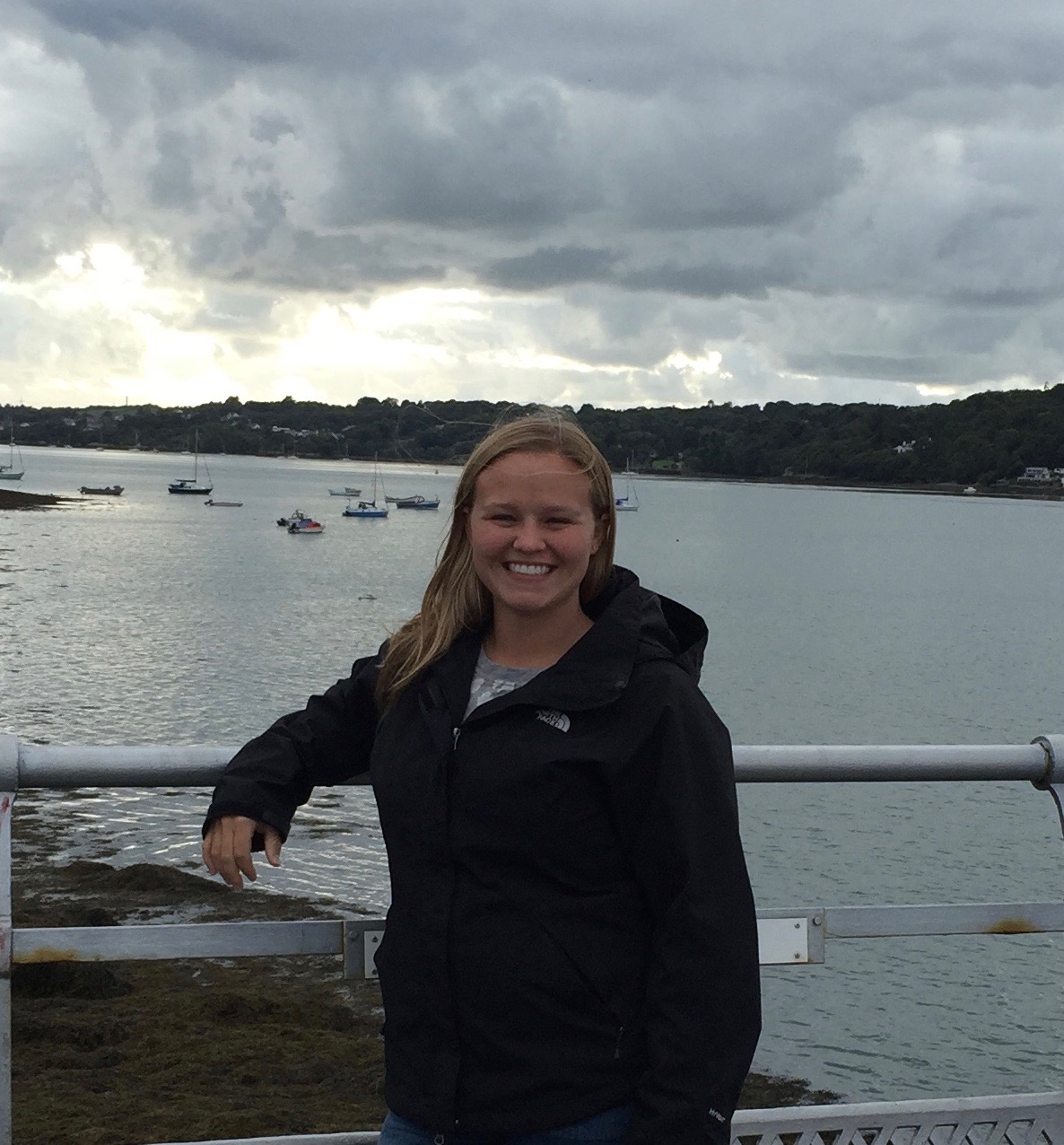 Shayna Sura
Shayna Sura
I am broadly interested in marine ecology and how bottom-up and top-down forces influence community structure. For my PhD, I am studying the role that herbivorous fish play in coral reefs in regards to preventing shifts to macroalgal dominance and promoting recovery back to coral dominance following disturbances. Herbivorous fish are an important aspect of healthy coral reefs because their grazing maintains algae in a cropped state, which prevents overgrowth of macroalgae, and herbivorous fish actually consume macroalgae, which can promote coral recovery. Because herbivore grazing is important for coral reef resilience, I am interested in examining the influence of benthic structure, predation risk, and macroalgal palatability on herbivore grazing behavior and how this may affect spatial changes in overall grazing intensity on coral reefs. I am conducting my research on coral reefs around the island Mo’orea in French Polynesia.
M.S., Biological Sciences, University of Notre Dame, 2014: Impacts of harvesting on brine shrimp (Artemia franciscana) in Great Salt Lake, UT
B.S., Environmental Sciences, University of Notre Dame, 2011
Honorary Lab Member
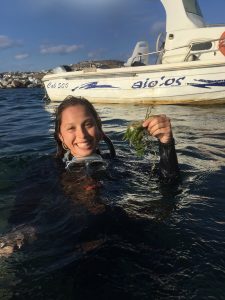 Kelcie Chiquillo
Kelcie Chiquillo
Kelcie is a Ph.D. Graduate Student at UCLA and joined the Barber lab in 2014, she is also an honorary Fong Lab member. She grew up in Sacramento, California, and did her Bachelors of Science in Marine Biology at San Francisco State University. She is broadly interested in marine conservation and invasive biology, specifically identifying the mechanisms that underlie invasion. Her study system is a marine invasive seagrass that has been introduced in the Mediterranean and is now overtaking the Caribbean seas. She is interested in the genetic and ecological processes that allow the invasive seagrass to outcompete other native seagrasses in the Caribbean. Her dissertation uses a combination of cutting edge molecular genetic tools and in-situ manipulative experiments to describe the impact of the invasive seagrass on native marine communities in Caribbean. She has developed a project to understand how it got to the Caribbean by focusing on the genetic diversity and gene expression across its native and invasive range, as well as conducting competition experiments to monitor its invasion to better inform management. Kelcie has presented her research at numerous national and international conferences, is the recipient of multiple grants, including the NSF GRFP, and is currently working on her orals and forthcoming scientific publications.

